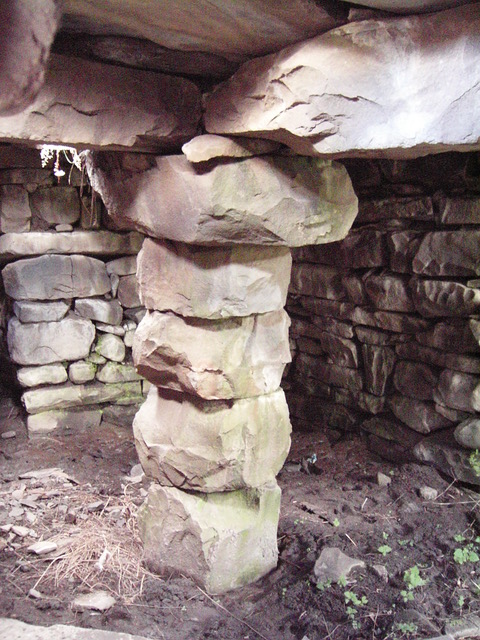Are words all different? Or are they all the same?
Imagine we have less than a life-time to describe the words of a given language. We might start from the view that each individual word is a treasure to be described in exquisite detail. Indeed, it is one of the achievements of our field that linguists have found and described gems like the following:
- Archi (Dagestan) has the word t’uq’ˤ. which is a stone post inside an underground sheepfold, which supports the stone roof.

- Soq (Papua New Guinea) has the verb s- ‘stay’, which is anti-irregular. While typical irregular verbs (like English go ∼ went) have unexpected forms but mean ‘the right thing’ (went means ‘go in the past’), the Soq verb s- ‘stay’ is the opposite of that. Its forms are unremarkable, but uniquely in the language, its present tense covers the time period of the English present (‘now’). All other verbs have a present tense (sometimes called ‘hodiernal’) which covers the period starting at nightfall yesterday and running through to and including ‘now’.
- Krongo (Sudan) has the noun m-ùsí ‘sorcerer’, where the initial m- tells us it is singular. The plural is nú-kù-kk-ùs-óoní ‘sorcerers’ with no less than four plural markers, each of which is found independently with other nouns.
- Russian skovorodá ‘frying pan’ seems remarkable only in that you have to wait for the last syllable to put the stress on the word. But in the plural, the stress moves forward three syllables: skóvorody ‘frying pans’, which makes it sound rather different.
- English dust. Yes, even English has some star items. The humble verb dust is an example of ‘Gegensinn’, that is, it means its own opposite. We can dust a cake with icing sugar (that is, putting on particles), the opposite of dusting the furniture (removing particles).

Dusting – even elephants love to do it! But there is a danger with this approach: we may well manage a few hundred items, and leave behind an unpublished dictionary. Or we may publish Volumes I-III (A-F), leaving the user stuck for words later in the alphabet: this happens particularly with larger projects, when grand intentions meet organizational and financial reality.
The alternative approach is to start from the assumption that all words in a language are the same. We soon discover, of course, that this is not quite true. There are dramatic generalizations to be made: we may find, for instance, that many words can occur alone, and some cannot. More generally different classes of words have different properties of combination with others. That is, we specify part of speech information (verb, noun, and so on). Consistent with this, wholly or partly, we may find regularities such as some words distinguishing tense while others do not. And real dictionaries embody such regularities as defaults. If an English dictionary specifies that compute is a verb, it is taken as given that it will have a past tense, that the form will be computed, that this past tense will be compositional (we know that what it means is a combination of the lexical meaning of compute and the grammatical meaning of PAST). And when a default is overridden, the information is given in the dictionary entry. For example, the past tense of go is went (and only the form need be given, since our default assumption about what it means will hold good), or that binoculars is a noun but lacks a singular.
I have described not one, but two straw men, though I have met real people who came close to these extremes. The point is that the interest of the linguistic gems we started with comes precisely from the way in which they stand out against the backdrop of the general picture. We know that there are general defaults – otherwise speakers and hearers would not cope. We expect singular and plural of a noun to be linked by a simple formula, rather than by a stress-shift that dramatically changes the way the noun sounds, as with Russian skovoroda ‘frying pan’. So in principle we can start from either end (words are all different or words are all the same), so long as we have the other horizon in view too.

Don’t forget to destress when using a frying pan in Russian… But if you can’t take the heat, time to get out of the kitchen! Of course, real people tend to feel more comfortable working from one end or the other; lexicographers are, arguably, more interested in the differences and linguists more in the generalizations. And there are important movements within the field where dictionary-makers point out the need for much more detailed grammatical information about individual words, and conversely where linguists point out that the broad classes we often work with need to be broken down into rather finer detail.
A saving grace in all this is the possibilities offered by online dictionaries. We can present some of the richness of words in new ways. For example, rather than trying to describe what the pillar that holds up the roof of an underground sheep fold looks like, we can give a picture. The online Archi dictionary does this. And it provides the sound file, so that users can hear what the word sounds like. Indeed they can hear all the basic forms needed to derive its large array of forms (its extensive paradigm). What if the system of sounds comprising the words has taken years of work to unravel? We want to hear the sounds and see the system. This is something – among other good things – that the new Nuer dictionary offers.
Browsing in the Archi and Nuer dictionaries makes us marvel at how different those words are, one from another, and perhaps from ‘our’ words. And yet they are all the same too – they all use the same Archi and Nuer systems of sounds, and they fall into parts of speech which are interestingly comparable to ‘our’ parts of speech (verbs and nouns are distinct, and so on).
It would need several lifetimes for anything approaching a ‘complete’ dictionary of Archi or Nuer. But there are plenty of surprises whichever perspective we take: the dictionary entries tell us about the amazing differences between languages, but the innocent little markers (like v. and n.), and the sets of forms given, point to the equally amazing sameness.
If you enjoyed this post, why not check out our favourite untranslatable words from the languages we work on.